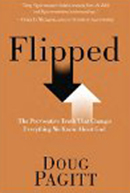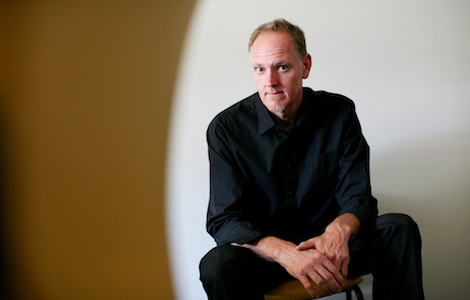
We all have stories about God in our head, and some of them are flat out misleading. One of the most common, according to pastor and author Doug Pagitt, goes like this: “If I’m faithful in doing this, then God promises to do that.” (Image courtesy of Doug Pagitt)
We all have stories about God in our head, and some of them are flat out misleading. One of the most common, according to pastor and author Doug Pagitt, goes like this: “If I’m faithful in doing this, then God promises to do that.” By accepting this story, he says, Christians end up making deals with God and exhaust ourselves in trying to fulfill our end of the bargain. In his book, Flipped: The Provocative Truth That Changes Everything We Know About God, he uses the teachings of Jesus, Paul, and the prophets to argue for why we should invert this story. Here we discuss this book and why he believes it can set many Christians free.
RNS: You say many spiritual people are trying to make a deal with God? How so?
DP: I understand making a deal with God as an if/then proposition. By that I mean, “If I do this, you’ll do that.” We have an agreement or deal in which God’s actions depend on mine. In religious talk, this plays out in a lot of ways. Sometimes it plays out in terms of salvation. Sometimes in terms of daily blessing. People believe–because the church has often taught–that God’s actions are contingent upon theirs.
 RNS: The alternative to what you call “If/then” theology is what you call “In God” theology. Explain what this means.
RNS: The alternative to what you call “If/then” theology is what you call “In God” theology. Explain what this means.
DP: If we understand ourselves as “In God,” we can no longer see our relationship to God as a connection that can be broken or that is contingent on our actions. In the book, I use the example of needing an adapter to use an electronic device. The if/then way of thinking implies that we need an adapter of some kind to have access to God. This implies that God is a separate subject with whom we can can lose connection. But if God is our very existence and we are ever and always in God, we are no longer tied to an if/then threat of lost connection. We can, of course, move toward greater integration with our existence in God, or we can move toward estrangement, but we are ever in God.
RNS: Where do you find support for your thinking in the Bible?
DP: It is all over the Bible. In fact, I think it is the primary message of the Bible. God as the very existence of all things shows up in so many particular verses. Acts 17:28 says, “In God we live, move and exist.” Colossians 1:15-16 says, “The Son is the image of the invisible God, the firstborn over all creation. For in him all things were created.” This is the prime reason the prophets and Jesus say that God does not desire sacrifice, but mercy. It is the only way the notion of there being nowhere we can go from the presence of God and it is, for me, the way that Resurrection has its primary meaning.
RNS: How will this “flip” in ones thinking lead to “flips” in one’s life?
DP: If one sees oneself as in God and not simply relating to God, or walking with God, or even having God in our heart, it will lead to greater hope and freedom. It will allow us to stop seeing ourselves under a constant threat of abandonment or broken connection and allow us to see ourselves as moving freely in God and as being ever creative with God as part of existence. It will allow us to stop wielding our faith as a tool for separation and exclusion and use it instead for healing and love.
RNS: What are some practical flips that might be good?
DP: Let me suggest three:
The first flip is allowing oneself to believe that flips, or changes of mind, are good and they indicate growth and process rather than weakness or instability. Flips are happening in many of us all the time. And it can be tempting to try and tamp them down in fear that they will show a lack of consistency and steadfast faith. Start seeing flips in you and others as a wonderful invitation to grow.
The second flip is shifting our understanding of self-sacrifice and the pervasive belief in religious culture that we are trying to prove something to God through our deep dedication and rather frame our lives knowing that there is nothing sacred while other things are profane. Making the everyday a part of God is so freeing. As hard as it has been for the last two millennium to agree with the Apostle Paul that “The God who made the world and everything in it is the Lord of heaven and earth and does not live in temples built by human hands. And he is not served by human hands, as if he needed anything. Rather, he himself gives everyone life and breath and everything else…For in him we live and move and have our being.
Third, stop thinking of people in categories of “Good guys and bad guys”. Flipping from God being in only some places and people to all being in God means that “we are all his off-spring” and makes it possible for us to live as Jesus called in perfect love, loving and blessing the good and the unrighteous. Jesus said, “You have heard that it was said, ‘Love your neighbor and hate your enemy.’ But I tell you, love your enemies and pray for those who persecute you, that you may be children of your Father in heaven. He causes his sun to rise on the evil and the good, and sends rain on the righteous and the unrighteous. If you love those who love you, what reward will you get? Are not even the tax collectors doing that? And if you greet only your own people, what are you doing more than others? Do not even pagans do that? Be perfect, therefore, as your heavenly Father is perfect.”
For me, this call has lead to active non-violence and it may well do the same for others but whatever impact it has on a person, I hope all will know that no matter where we go, no matter what we do, regardless of who we become we will know that even if we run from God or from others, we never need to hide who we are for “in God we live, move and exist”.






